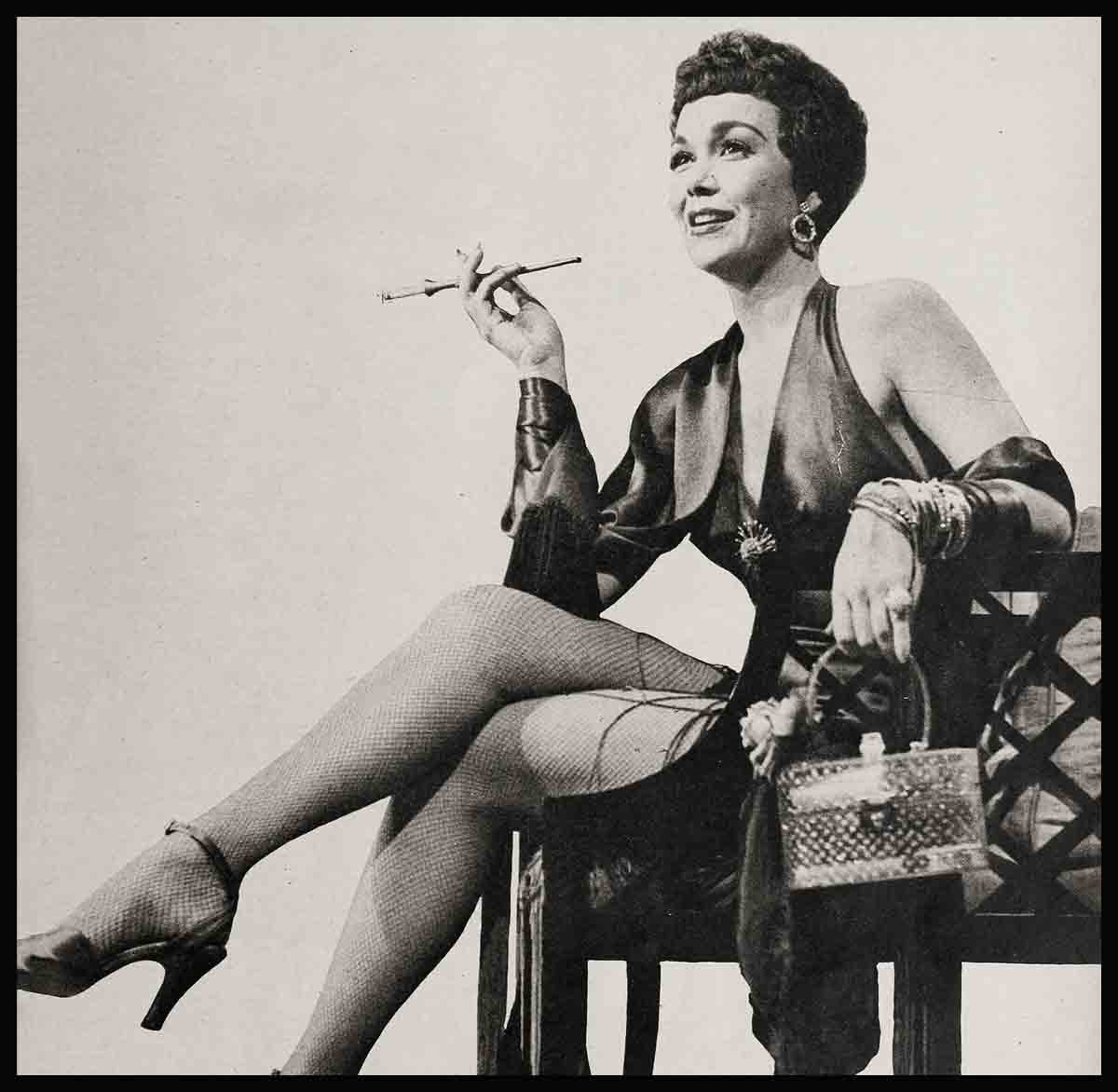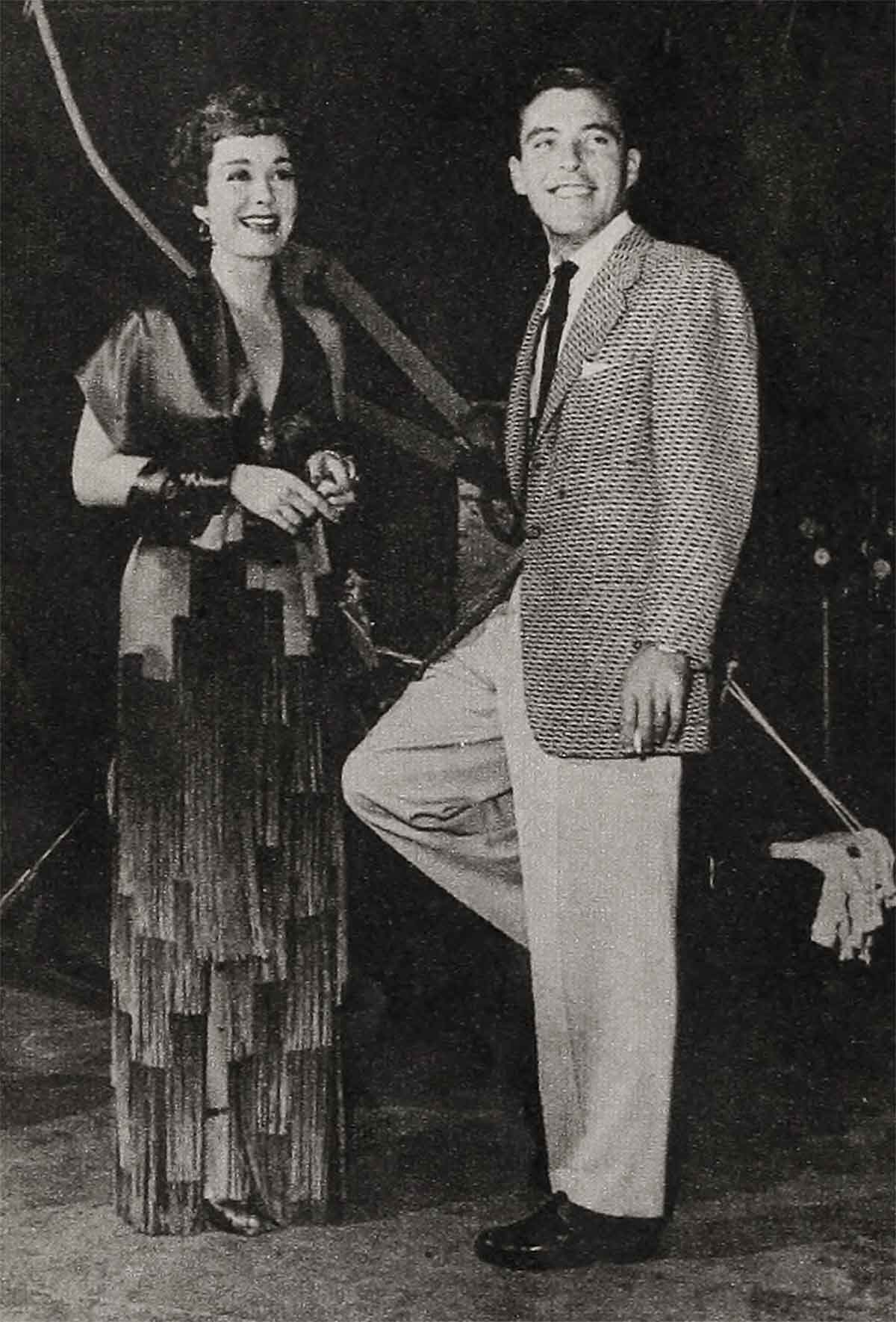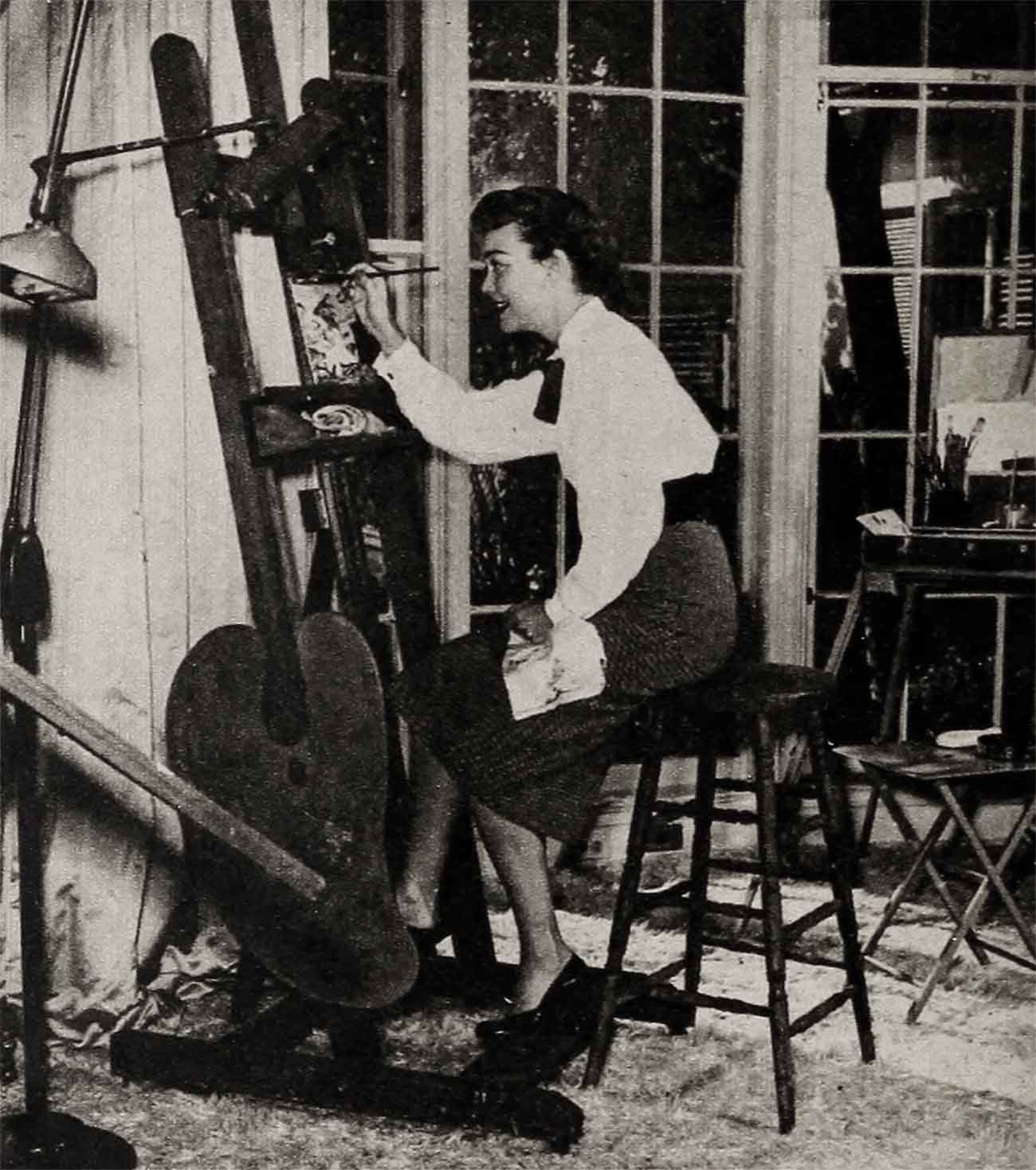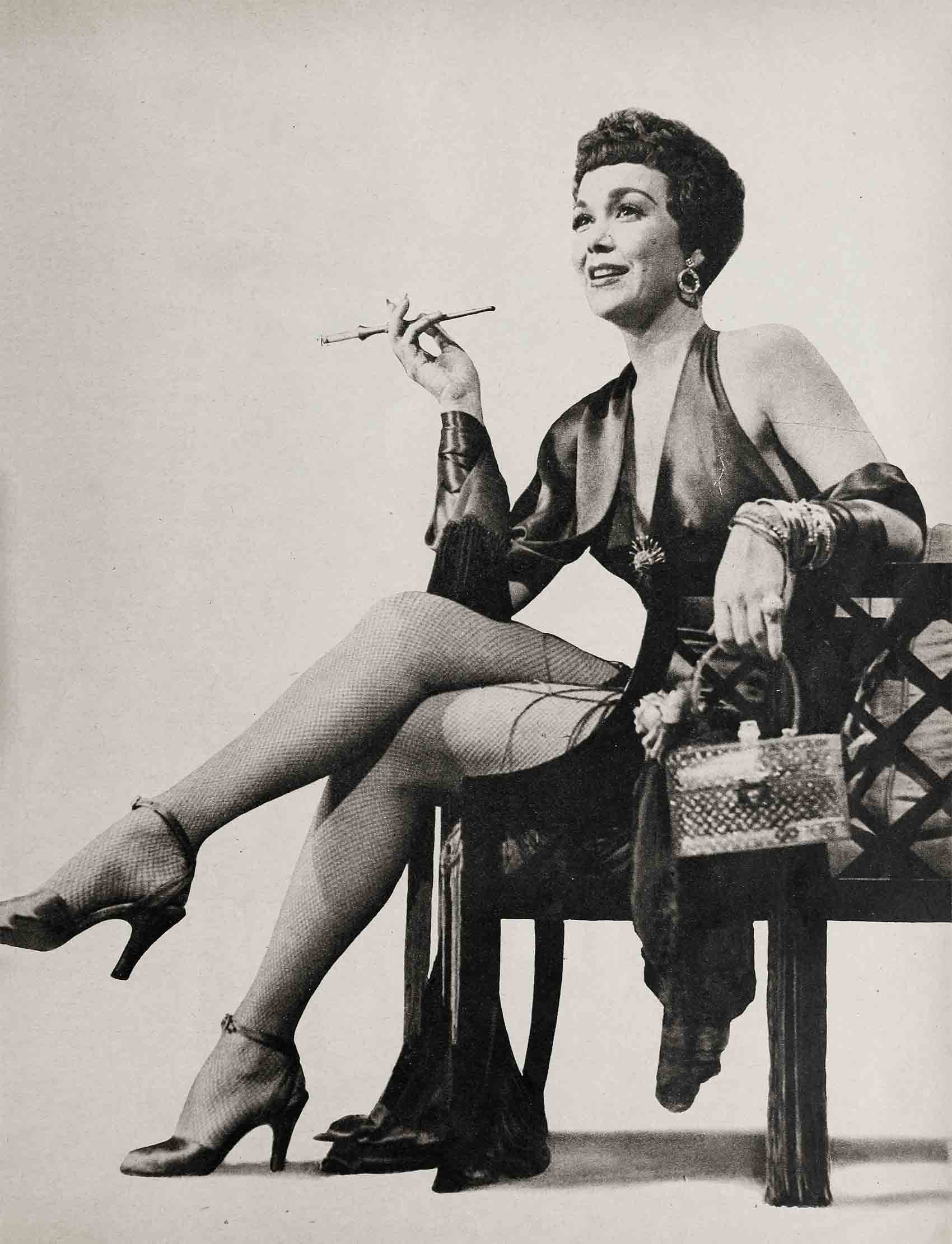
Making Up For Lost Time—Jane Wyman
The Cadillac limousine—one that was almost as long as a bus—purred up to the door of Jane Wyman’s home. Six men, all in tails and top hats, got out and stood in a single file from the doorway to the car while their leader rang the bell. When the maid arrived, she grinned a little foolishly, then excused herself and summoned her mistress. Jane appeared in a moment, elegantly strutted to the car, got in, followed by the men, and the limousine slipped into the traffic headed for downtown Hollywood.
Fifteen minutes later the car pulled up before a rather large but modest building on a side street just around the corner from Grauman’s Chinese Theater. The alighting procedure was the same. The men got.out, formed a line, removed their toppers and stood like wax images as Jane walked into the building. Then they followed as formally as ushers at a wedding. The door shut behind the lot of them—and a ceremony unique to Hollywood behind that closed door.
The building into which Jane Wyman walked that night was the famous Hollywood Masquers’ Club—and Jane was one of the few women ever to enter its portals. Definitely she was the only lady movie star to be asked into the building. The occasion was as unique as the incident appeared. For that night the Masquers were giving Jane Wyman an honorary dinner, something they have reserved for only the most renowned male actors—and a feast and tribute no Masquer ever thought would be accorded a female.
The Masquers who were there that night will tell you there has never been a happier evening in the club, nor were more enthusiastic speeches ever aimed at a celebrity. Two hundred men sat about the room, the dais was jammed with stars, executives and officers of the club, and in the very center sat Jane, the lone woman. Speakers arose and, as they do at such banquets, told of the qualities of the guest of honor and of the laurels she had won.
There was Vince Barnett, the comedian, who spoke of the early days in Jane’s career and told how she had never changed with success. “But he didn’t tell,” Jane said, “about how he used to feed me when I was hungry.” There were the casting men who had given her a helping hand, the actors who had spoken to directors about her when she needed the jobs and the boosts; and the directors themselves who bragged now that they had been lucky to get her. And then Jack Warner, the head of Warner Brothers, who modestly said: “Jane has been working for me for nearly 15 years now—and just for that she ought to be given a banquet.”
Then Jane was called upon to speak. She had prepared something in her mind, an outline expressing thanks for the honor of the night. But as she stood up to talk it all went out of her head, and she just looked down at the table cloth, so they wouldn’t see the mist in her eyes, and spoke extemporaneously. She started with the man at the foot of the table and she told how good a friend he had been—and then she went the length of the board and all about the room, and she picked familiar faces from the crowd and gave credit for her success to all of them one by one. Afterwards they all drifted about the club house and talked and sang songs together. When the doors closed finally in the small hours of the morning, the caretaker shuffled off to his quarters muttering happily that it had been the grandest Masquers banquet of them all.

Thus, it would seem that in 1953 the star of Jane Wyman has risen to its zenith. That with almost 20 years of screen acting behind her she has reached the promise of her career. She has received just about every recognition Hollywood gives its own, as well as accolades from the public and press of almost every nation. She has an Academy Award. She has been known as the sexiest of the leggy young contract girls—and she lasted to get an Oscar for a believable portrait of a mute drab. She has been married, has had children, has been divorced and married again. And today she stands as proof that in Hollywood anything can happen if a girl has talent and fortitude. And luck.
What is Jane Wyman’s life like today? Well, those who have known her since she first came to Hollywood as a blonde young dancer say that the years have been more than kind to her. She has embellished the face and figure that even as a kid stopped traffic on the studio lots. She has all the vigor she started with, and certainly the health. Time has brought her riches, too—and she lives a bit differently than the early days—in a fine home, with the ice box and deep freeze well filled.
With her husband of a few months, Fred Karger, Jane has a household of five—her children, Mike and Maureen, and Fred’s 11-year-old daughter Terry. They live a rather simple life, built around the activities of the kids when they’re not working. But in the evenings, except for the few occasions when they dine out or go to small parties, Jane and Fred make it a family affair around the TV set or a corn-popper in the fireplace.
“What I really want out of life now,” Jane said, pert as a teen-ager impersonating a grown-up, “is the relaxation that is supposed to come after a long stretch at the factory. I want to take it easy between pictures now, and maybe between assignments get a chance to travel to Europe and see the sights of the world I’ve been too busy to look at before.”
Actually, it is a little difficult trying to think of Jane Wyman taking things easy. An average day in her life consists of rising at 6:30 A.M. for an early studio call, keeping the make-up staff in stitches as she gets ready for the day, coming on to the set like Gangbusters and chattering like a Minah bird until lunch, doing a publicity interview from 12:00 to 1:00 and then back on to the set with the same enthusiasm until the 6:00 whistle blows. After that she’s ready for a hearty dinner, a party, fun with the kids, or a quiet session with a novel before turning out the light for a few hours’ sleep. This routine is not pressed upon her. She demands it.

A few weeks ago Jane threw a party. Most of the people attending were from the movie she was making or they were working on other films. About 11:00 the fearsome early risers began to drift, and at midnight Jane and Fred saw the last of them to the door. Fred looked a bit sleepy, but Jane was wide awake. As she started up for the shut-eye that was to last her until six or so the next morning, she frowned. “I guess they didn’t have a very good time,” she said. “Nobody wanted to stay.”
“Yes, dear,” her husband said, not troubling to remind her that other people weren’t made of iron.
Maybe Jane Wyman has been saving up for the lusty life she manages to cram into every 24 hours now. For the past five years, ever since she has been divorced from Ronald Reagan, she has been a bachelor girl, with most of the spare time on her hands that the average bachelor girl falls heir to. Although she has been linked with men a few times during that five years, the times between were long and the romances few. She had interests, all right, but none of the purpose a girl can find with a man of her own. Now she is catching up.
Fred Karger, Jane’s husband, is a perfect mate for her. He is not at all the Hollywood type of man, not the playboy sort who haunts the parties and dates a different doll every night. Fred comes from a rather well-to-do family, but he has always worked for a living. For a few years he has been the leader of an orchestra that played for most of the society parties given in Los Angeles and Pasadena, and a few Hollywood parties. During the day he is composer, arranger and the supervising musical director of Columbia Studio. As a matter of fact, although they have known each other casually for years, it wasn’t until Jane began making Let’s Do It Again at Columbia that they first became more than casually attracted to each other.

Music is a kindred interest with Jane and her husband. Fred is a fine pianist and accompanist, and there is nothing that pleases Jane more than to have someone suggest she sing. If you’ve heard any of the records she has made or seen her with Bing Crosby in their Paramount pictures, you know she’s not bad. With music for a starter they began discovering other compatable likes and now they are practically as one on everysubject. This is quite a feat with a girl as singularly positive as Jane Wyman Karger.
“I don’t know how anybody stands me sometimes,” she said. “I get an idea about something and that’s it. Maybe sometimes I’m wrong, but while I think I’m right I can’t be fooled with. It must be a kind providence that brought Fred and me together. He not only thinks the way I do—I find myself agreeing with him as soon as we begin discussing something.”
It is a very difficult thing in Hollywood generally for a movie star to find a husband she can also work with. In the case of an actress and actor being married you’d think it would be a cinch, but it isn’t. Directors married to stars seldom get a chance to make movies together. But it looks as though Jane and Fred will be able to overcome this problem. Jane is definitely interested in making musical pictures, as well as records, and Fred can be the musical advisor around the house. Even if a film isn’t a musical there is always a score. This makes it possible for them to go abroad if they want to and still not have to give up part of the career of one of them.
Professionally, Jane Wyman has never been in better shape. Not even right after she won the Oscar for Johnny Belinda. She has a couple of unreleased musicals in the can and as this is being written she is getting ready to begin one of the most demanding roles of her career in So Big.
“The thing that bothers me about this picture,” Jane said, “is that I have to look 18. Then I go to about 60. That’s a big jump.”
Well, Warner Brothers aren’t too concerned. She can play 18 without make-up, and a bit of old grey hair and a swab or two of pallid make-up, a nest of wrinkles and she’s 60. But the studio does feel that So Big is one of its most important films in years, they plan it on a grand scale, so Jane can be sure that next fall when it is released she will have another important dramatic offering to offer the critics and award-givers.
One of the early maddening ambitions of Jane Wyman’s life was to be a dramatic actress. And it was at Warner Brothers, where she has made her biggest hits in the past few years, that she developed her most awful frustrations. Casting a picture in those days of box-office magic, when, as the saying goes, all a theater manager had to do was open the door and stand out of the way to let the customers charge in, was done according to a casting book. If a producer had to make a picture in which an actress was to lose her baby to a rich husband, all he had to do was get an actress who could cry. If he wanted a comedy, he got an actress who could tell a joke or hit the leading man in the face with a ripe tomato.
Jane Wyman, in the casting books, was a cute little buffoon who could dance. Period. She spent several weary years trying to tell the men in the front office that she could also cry—and would like to get a chance to make an audience cry, too. One day a part came up that Bette Davis was being considered for, but Bette for some reason or other couldn’t make the starting gate. Jane, who usually walked around the lot in slacks and sweaters, decided to make an impression as a sad one, and for a week or two she wore what were practically widow’s weeds to the studio. Nothing happened. She’d trot about like a saddened woman in search of a tombstone, but no one paid any attention, except to say, “Hi Janie,” just as always.
She tried throwing a sombre note into lunch in the commissary, dropping in attired as Mother Hubbard, or close to it. Nothing happened. Then one day she saw a producer eyeing her carefully. She put on the sour puss and waited. Sure enough he came over to her table and gave her a closer inspection. Finally he spoke.
“Do you think,” he said, “that you could play a burlesque dancer? I’ve been watching you—and you seem to me to be just the type.”
“Out of my way,” Jane cried and dashed from the commissary.
The way she got Johnny Belinda is that producer Jerry Wald saw her dressed like a cutie one day and, being a great believer in off-beat casting, decided she was just the type to play a deaf mute.
It is a strange thing that today, after topping all the laurels she needs as a dramatic actress, Jane Wyman likes nothing better than to have her agent call up and say that somebody wants her for a crazy musical.
Time has been kind to Jane Wyman—and the Jane Wyman of today will be the first to tell you that. Along with the progress of her career, her emotional life has been fruitful. While she was married to Ronald Reagan she was very much the housewife and early mother. They were serenely happy together until their different interests broke them up. When the separation did come it was not one of the ugly messes that are so common in Hollywood, but a grown-up facing of a mutual problem. And even after the divorce, when most movie couples are victims of sniping tongues and speculations, Jane managed to keep a dignity in her position of grass widow.
The only other romances of consequence she has ever had were the ones with Greg Bautzer, which she herself will admit was just fun, and the short-lived engagement to Travis Kleefeld. There has never been a nicer young man to invade the stars’ domain than Travis, so there was no finger of defamation pointed at her in that matter either. In between, Jane has kept her lady-like character and was still able to keep her reputation as a fun girl and, incidentally, a great wit.
This year is a new beginning of the road for Jane Wyman. What has happened to her in her life before this year has been wonderful, but it has not been fulfilling enough to satisfy her. She began 1953 with a rainbow shining across the hill from her bedroom window on New Year’s Day, and she vowed, she says, on that morning to start to find all the happiness and good things that are promised folks who find the end of that rainbow. During the early part of the year she fell in love and her home was filled as fully as her heart. She is at an age now where she appreciates the comforts that can come from children, and where she can look long at the trophies of her craft that fill her den and feel a warmth from them.
She wants to build a dream that will come true.
“I guess I haven’t knocked around much,” she said, “but somehow I feel as though I have and I want the fruits of the hard work I have done to be about me from now on. I’ve loved my home and my family before, but never as much as now. This is my year to move.”
There will be another ceremony at the Masquers Club in Hollywood one of these nights soon. One that Jane is not aware of at the moment. It is called The Spelvin Award. It has been given to very few actors and, again, no actresses. It is named after the legendary actor who has appeared on many playbills but has never existed, George Spelvin. George Spelvin is the name used in the theater when an actor plays two roles—and does not desire to be billed in one of them. It is actually a tribute to a performer of great versatility.
One night soon the long limousine from the Masquers will again pull up before Jane Wyman’s home. The six men in the top hats will alight again and escort her to the club. She will once again be the only woman in the place, a girl and 200 men. The usual speeches will be made. And Jane will be called upon again to make an address, to talk to and about the fellows she has known all of her professional life. And then the Spelvin Award will be in her hands. It is a statue of a man in a tall silk hat, a bit battered but still doing a show. That’s Jane Wyman, a woman, but the only one in her line of work to get this recognition.
And when she gets home, she’ll put it in the breakfront along with the rest of her prizes, and she’ll treasure it always. But it won’t mean the cap on a career for Jane. No, sir, she’s looking ahead. She’s just going to get going in 1953.
THE END
—BY RICHARD DEXTER
It is a quote. MODERN SCREEN MAGAZINE JULY 1953




